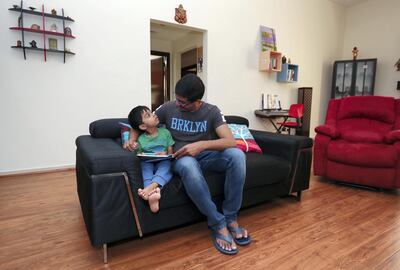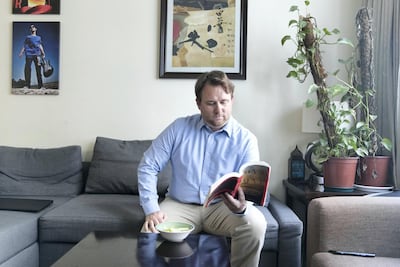Others may call it downsizing but Karthik Jayakumar says he “right-sized” when he moved from one apartment block in Dubai’s Karama to another building just six metres away, saving Dh37,000 a year in the process.
The Indian healthcare professional, 42, was spending Dh90,000 on a two-bedroom apartment he had lived in for 10 years with his wife and two children, a daughter, 13, and son, 5.
Two weeks after sending a renewal notice this year for the same amount, the landlord decided to hike the rent almost 30 per cent to Dh115,000. Expecting a battle to find a new and cheaper place, Mr Jayakumar quickly spotted another two-bedroom apartment for Dh78,000 on the same street; he can even see his old home from his new balcony. Although slightly smaller, this 'right-sized' move shaved just 16 square metres off his old flat's floor plan.
His daughter, he says, was initially unhappy about the move: her friends were asking why they were moving to a much smaller apartment. “There are certain things they don’t teach you in school, such as cooking and how to handle money,” says Mr Jayakumar. “This comes under how to be prudent. I said that it was not a question of affordability, but of necessity. I told her: we have right-sized.”
According to US research by online stock broker TD Ameritrade, super-savers – those who save 20 per cent or more of their income – are less concerned about cutting down the lattes and scrimping on the supermarket shop and much more focused on keeping big-ticket costs such as their rent as low as possible.
The research shows that this group of people spends just 14 per cent of their income on housing, compared to the norm of 23 per cent – almost 10 per cent less.
Mr Jayakumar, who has lived in the UAE for 16 years, says his old building had started refurbishing and putting in “five-star” trappings such as Jacuzzis, wooden floors and remote-controlled curtains into empty apartments, as well as chocolates, branded water and a Nespresso machine for guests in the lobby.
“Real estate branded water or wooden flooring is not going to make me pay more," says Mr Jayakumar. “We don’t live like misers but nothing is free in life: I thought, eventually we’ll pay for this. I’m not spending Dh37,000 on perceived luxury. The apartment we are moving to has everything we need on a daily basis.”
That extra money, channelled properly into long-term investments, could pay for a post-graduate degree for one of Mr Jayakumar’s children or take years off his retirement, he says.
Teacher and personal finance columnist for The National Zach Holz says he is planning a move from a Dh78,000 hotel apartment in Dubai's Al Barsha to a room in a shared villa in Jumeirah for Dh48,000 so he can save the difference.
“Before, I always thought, I make enough and I get a housing allowance, let’s spend it and enjoy having my own space,” says American Mr Holz, 35, who has lived in the UAE for five years. But then he visited friends who lived in shared houses. “Getting to live in a mansion by the beach sounded like something I’d like – and for significantly less money,” he says.
Even with rent having dropped, a one-bedroom apartment in Al Barsha today would cost him Dh55,000, he says, with utilities and cleaning costs on top. The Dh48,000 he anticipates paying as rent for a shared villa would include those bills – and hopefully a private swimming pool. “When you pay it, you pay it and you’re done,” he adds. “The only features I’d be losing are a maintenance crew on site and maybe the guy that cleans my car.”
He even thinks that downsizing from an apartment to a bedroom provides an opportunity for him to “minimise material possessions”, to make it easier to move home later on without paying to ship boxes of accumulated goods.
US government data shows that Americans spend around $60,000 (Dh220,350) a year, a third of which goes on housing. And not all of that spend is necessary: new homes built in the US today are, on average, 93 sq metres bigger than in the 1970s, at 250 sq metres.
Steve Cronin, founder of DeadSimpleSaving.com, says that if you are in dire need of reducing your outgoings, due to debt or losing your job, "the major items are going to have a big impact". That probably means downsizing your home, changing schools to cut fees down, stopping remittances and selling cars. "If you have credit card debt, you have to do this quickly to prevent your debt spiralling out of control," he warns.
Reducing your expenses is "doubly effective" as it will allow you to save more each month and get you used to having a "more cost-efficient lifestyle", he says, which will take you smoothly through to retirement. Millionaire Expat author Andrew Hallam adds that an extra $600 (Dh2,204) in rent per month would have a long-term opportunity cost of more than $1 million (Dh3.67m) if it had been invested.
For families, the second largest expense after housing is often school fees, says Jenny Mollon, reviews editor at Which School Advisor. She says schools have seen evidence of ‘fee hopping’ – families moving their children to take advantage of early-bird rates at new schools.
However the site shows that the older the school the less expensive it tends to be, once those initial discounts at the new competitor have ended. The average fee for a school that has been open for less than five years is Dh48,000, while it is Dh39,200 for a five-year-old school and Dh29,600 for a decade-old one.
It is “of course tempting” to fee-hop, says Ms Mollon: the most expensive international baccalaureate school in Dubai, Uptown School, costs up to Dh87,374 per year, while the Emirates International School in the Meadows, the cheapest IB school in Dubai on the site, costs from Dh26,802 per year. But she cautions parents to remember that changing school is a “very big” decision with “a long-lasting impact upon a child’s life”.
“Of course, parents need to balance the family accounts and, with two or more children to fund, changing schools may become the only option,” she adds.
Another saving for the shrewd or for those needing to cut their outgoings comes from using public transport and getting rid of costly private vehicles. Joaquin Ablatico, a 29-year-old Spanish marketing manager who has lived in Dubai for a year, says he has halved his transport costs by taking the metro and taxis instead of driving.
He rented a small car when he first came to Dubai, he says, at a cost of Dh650 a month, whereas he spends about Dh8 a day now for his commute by metro, with taxis for nights out bringing the bill to around Dh300.
Even cutting your mobile phone bill can help. Mr Cronin says he switched from Etisalat to Virgin and his bill dropped from Dh250 to Dh50-Dh100 a month. “That may not be a huge amount but systematically applying the process to all your expenses is effective,” he adds.
Mr Jayakumar says that leaving the family home of the last 10 years has been a good life lesson for his daughter. “In the end I am happy that prudence prevailed over public posturing,” he says.



